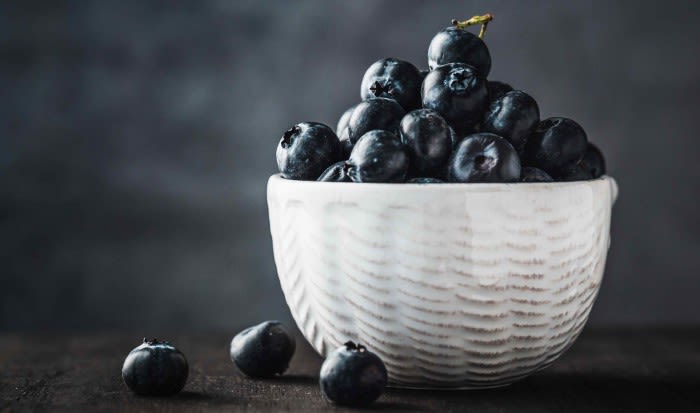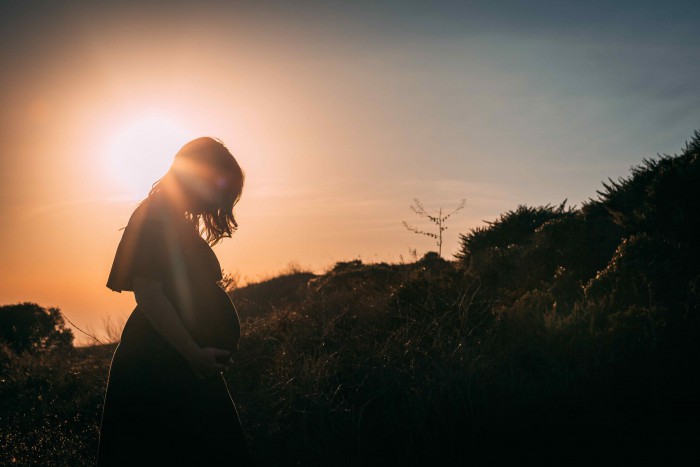“After a month, I’d lost half a stone and my pain lessened”
One year on The Body Coach app – and how it changed this woman's life.
Sign up to The Body Coach newsletter to get inspiration in your inbox every Monday.

Charlotte Stirling-Reed is a registered Nutritionist who specialises in maternal, infant and toddler nutrition. Charlotte helped me develop my first baby recipe book 'Wean In 15'. In this blog, Charlotte shares some tips and advice on what to eat during pregnancy.
During pregnancy it's so easy to focus on what NOT to do. There are plenty of rules about the foods we should avoid, but I always feel like we should be placing much more interest on all the foods and ingredients we SHOULD be including in our diets.
The first 1000 days
Firstly though, there is a concept known in research fields as "The First 1000 Days of Life". This time period counts as the moment from conception, right through to a child's second birthday, and we know that the foods eaten and the dietary patterns established during this time can actually affect children's lifelong health! So it's well worth trying to get our own nutrition right during pregnancy (as much as possible) as well as when we start introducing solid foods to baby too.
Obviously we want to focus on what we SHOULD be eating, but a very quick run down of what foods should be avoided is helpful too, so first up…
What to avoid
The NHS recommend that pregnant women in the UK should try not to eat the following foods/drinks:
For more information, including details on WHY these should be avoided, you can find more info on the NHS website.
Now for the positive part – what foods to include to help you and your baby grow and develop well…
What to eat
Ultimately a balanced diet is what we recommend during pregnancy. The same as that recommended for the general population. You don't need to eat a special diet, but just focus on a balance and eating foods from the main foods groups:

However, there are some foods that could be extra beneficial during pregnancy, whether that's delivering on nutrition and helping the growth of your baby, or for helping you to relieve the symptoms of pregnancy. I'm a big advocate of including these particular foods in your diet when you're having a baby.
Wholegrains
Especially oats. These offer energy, protein and fibre for your body, helping you to fight fatigue, which is often common in those first months of pregnancy. They will also help to keep your digestive system healthy as constipation and diarrhoea are also common pregnancy symptoms. However, what's the best thing about oats? They are super filling and versatile, so you can sprinkle them on salads or pudding, take them on the go as overnight oats or have a steamy bowl of porridge and peanut butter in the morning in just a few minutes time!
Salmon
Such an important food, especially during the last trimester of pregnancy when there is a growth spurt in a developing baby's brain. Other oily fish such as mackerel, sardines can help provide this. But remember to have no more than two portions a week.
Bitter greens
Flavours from the foods eaten by a pregnant mother can be transferred to the amniotic fluid which is swallowed by an unborn baby. Therefore, a baby can be exposed to flavours from the mother's diet very early on and research suggests that this may help to alter food preferences later on. So getting plenty of bitter, savoury and sour tastes from green veggies in your diet during pregnancy might just help your little one to more readily accept these foods on the outside during weaning too. Dark green leafy veggies are also a source of folate, which pregnant women are recommended to eat more of in the UK too.
Yoghurt
Dairy foods provide calcium, iodine and B vitamins, and some of these can be harder to get on a dairy-free diet. Iodine and B vitamins are important for normal cognitive function and so making sure, if you're dairy free, you're getting these nutrients in another way (e.g. supplements and/or fortified foods) is important. Yoghurt is an easy way to get your dairy portions in, on the go, chucked into soups and sauces or dolloped on your pudding/brekkie.
Red lentils
Lentils, as well as other beans and pulses, are a good source of iron, B vitamins, protein and fibre. Many women are at risk of being low in iron during pregnancy, simply because the body uses extra for growth and for providing extra blood. There are no recommendations to increase iron intake, but if you were low to begin with, or simply don't get enough iron in your daily diet, you could be at risk of iron deficiency anaemia. Lentils, meat, chicken, beans and pulses are all good sources of iron and combining these with plant-based sources with vitamin C from fruits and veggies can help enhance the absorption of iron from these foods.
Eggs
Eggs are a super versatile food, but they are also a good source of a number of nutrients that are sometimes harder to get from other sources. Eggs are naturally rich a fair few vitamins and minerals, including: B vitamins, Vitamin D, selenium, iodine. On top of this they contain folate and choline, two important nutrients for neural development in a growing baby.
Nuts
A fantastic food to include in your diet (as long as you're not allergic to them!) as they are energy dense, packed with nutrients but also great as filling snacks and as an easy addition to meals. You can use them ground, milled, whole or as nut butters in most dishes to add some flavour and nutrition. Many people are cautious about eating nuts during pregnancy, mainly because the Government previously recommended avoiding them if there was a history of allergies. This advice has changed based on lots of research so nuts are absolutely fine to include in your diet during pregnancy!
Don't forget that during pregnancy you're also recommended to take a 10mcg supplement of vitamin D throughout pregnancy and a 400mcg folic acid supplement until the 12th week of your pregnancy too!
The above are some of my FAVOURITE foods to include in your diet when you're having a baby. They aren't by any means ALL the foods you should include, just some that can be beneficial. A balanced diet is ALWAYS going to be the best option. I have lots more info on pregnancy on my blog, and many people find this Pregnancy Food Checklist helpful as a daily reminder too.
A little more about Charlotte Stirling-Reed
I qualified as a Nutritionist after undertaking a degree in Nutrition and Human Biology and a Masters in Nutrition and Public Health, following which I spent a few years working in the NHS as a Child Nutritionist. Since starting my own Freelance work I have been working really closely with the media, appearing across TV, radio and print discussing a variety of nutrition topics, but more recently, since I've had my son, Raffy, talking more about maternal and child nutrition. I also work with brands and the food industry to spread more evidence-based messages about the food we eat and the food we feed our kids too.
You can find out much more about me, about the work I do and about Maternal and Child Nutrition by visiting my website www.srnutrition.co.uk and by following me on Instagram @SR_Nutrition where I share my own food journey with my little boy.